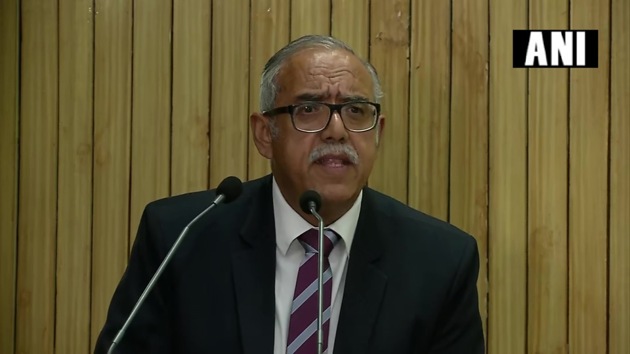‘Criticism of govt, institutions not anti-national’: Supreme Court Judge Deepak Gupta
Speaking at an event organised by the Supreme Court Bar Association, Justice Gupta, in a speech titled “‘Democracy and Dissent” emphasised that every individual has the right to dissent and disagree not because it is provided in the Constitution but because it is a human right.
Disrespecting the government is not the same as disrespecting the country and those opposed to an elected government, which has come power with a substantial majority, are not obliged to remain silent for the next five years, Supreme Court judge Justice Deepak Gupta said on Monday.

Speaking at an event organised by the Supreme Court Bar Association (SCBA), Justice Gupta, in a speech titled “‘Democracy and Dissent” emphasised that every individual has the right to dissent and disagree not because it is provided in the Constitution but because it is a human right.
“..majoritarianism is the antithesis of democracy... assuming they represent more than 50% of the electorate, can it be said that the remaining 49% of the population has no voice in running the country? Can it be urged that the remaining 49% cannot speak for the next five years till next elections are held? Should these 49% be totally ignored if they oppose what is said by the Government? In my view, the answer has to be a big ‘NO’,” he said.
The lecture is the first of the series, organised by the bar association. The lecture was attended by Attorney General KK Venugopa, SCBA President Dushyant Dave, and senior counsel CU Singh.
Justice Gupta was elevated to the Supreme Court in February 2017 and is set to retire from office on May 6, 2020.
His comments are significant because they come against the backdrop of a prevailing trend where anyone not agreeing with the government, or opposing a law is accused of being an anti-national -- sometimes by ministers, and at other times by members and supporters of the ruling party.
One may be disrespectful to the government and that does not translate to disrespect for the country, Justice Gupta said. He added that this trend was what made him pick the topic from “many topics given to me”.
“Just because you hold a contrarian view does not mean that you are disrespectful to the country. You may be disrespectful to the government or the powers that be, but the government and the country are two different things.”
The government, Justice Gupta stressed, has no right to stifle or quell protest as long as they are peaceful.
“Protest also means expressing dissent which is part of the legacy left by the father of the country (mahatma Gandhi) in the form of the Civil Disobedience Movement, following the path of Ahimsa,” he observed.
The judge also said that he was troubled by the recent instances of bar associations in various parts of the country passing resolutions refusing legal aid to those accused of certain offences. Such resolutions, he said, go against the Advocates Act -- which lays down standards of conduct for lawyers -- and amount to obstruction of justice and are “unacceptable”.
The judge also underscored the importance of dissent in judiciary.
“There can be rule of law only when we have judges who can take decisions independent of political influence, totally uninfluenced by media or any other extraneous considerations”, he said.
He referred to various dissenting judgments from across the world and India many of which, subsequently, became the law. He took the examples of dissenting judgment of justice HR Khanna in the ADM Jabalupur case, justice Fazl Ali in the AK Gopalan case, justice Subba Rao in Kharak Singh case, justice DY Chandrachud in the Aadhaar case and justice Indu Malhotra in the Sabarimala case.
Dissent, he said, is a powerful tool in the hands of a judge and it must be used responsibly. However, he also cautioned that judges should be careful while exercising dissenting powers.
“Dissenting for the sake of dissent will make the dissent lose its value,” he said.
Justice Gupta also highlighted the importance of criticism in democracy and urged all institutions including the judiciary to welcome criticism. Criticism of the executive, the judiciary, the bureaucracy or the Armed Forces cannot be termed “anti-national”, he stated and attempts to stifle criticism will turn the country into a police state which was never envisaged by the founding fathers of the country.
Get Current Updates on India News, Lok Sabha Election 2024 live, Infosys Q4 Results Live, Elections 2024, Election 2024 Date along with Latest News and Top Headlines from India and around the world.



